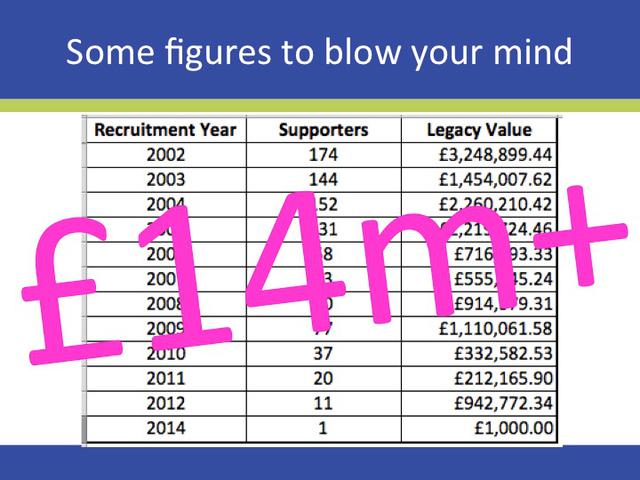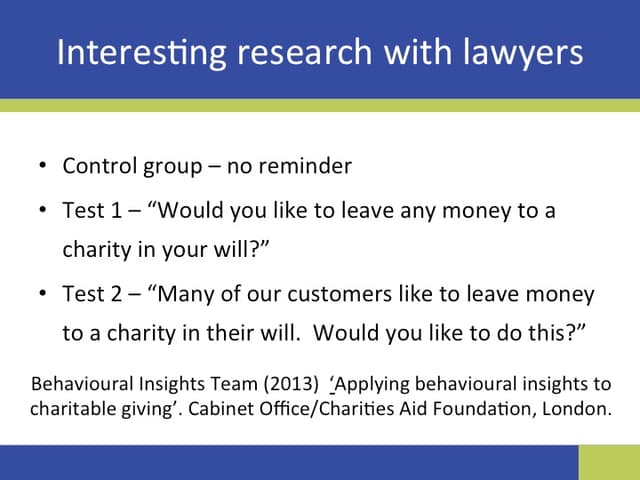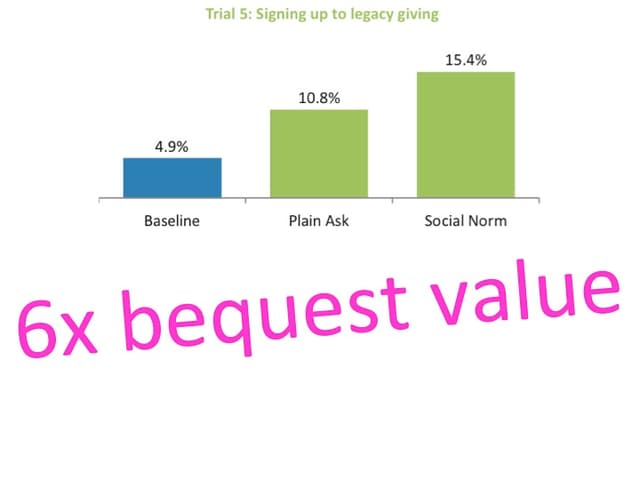Remember a Charity’s initial research into legacy giving
- Exhibited by
- Stephen Pidgeon
- Added
- July 20, 2015
- Medium of Communication
- Target Audience
- Legacies in the UK
- Type of Charity
- Country of Origin
- UK
- Date of first appearance
- 2013
SOFII’s view
If you want to increase the legacies your charity receives, you will find some interesting insights from this research by Remember a Charity in the UK. The potential benefits are breathtaking if they can be achieved.
Summary / objectives
To undertake research that would find the simple questions that could improve the number of people who include a charity in their will.
Background
Gifts in wills are incredibly important to UK charities, without this income they would have to cut services and many would not exist. Charities in the UK currently receive £2 billion per year, 13 per cent of all charitable donations, through gifts in wills.
Remember A Charity was launched in 2000 and is formed of over 140 of the UK’s favourite charities. They work with member charities and partners in the legal sector, government and private sector to encourage more people to consider leaving a charitable gift in their will once they’ve looked after their family and friends.
Together, they aim to do what an individual charity can’t do alone: make legacy giving a social norm.
This pioneering research, which looked at over 1,000 new wills over six months, was conducted by the Cabinet Office Behavioural Insights Team in partnership with Remember a Charity and the Co-operative Legal Services to establish how to substantially increase the number of legacies to charities.
Creator / originator
Remember a Charity and the Cabinet Office
Test details
In the control group of people looking to make a will, the person acting as adviser, a solicitor or other ‘will writer’, didn’t mention a possible gift to a charity. In practice 4.8 per cent of people did it without prompting – that therefore established the ‘norm’.
In the first test group, they were simply asked if they would like to leave any money to a charity. In a second test group, a more complex question was asked: ‘Many of our clients like to leave money to a charity in their will; are there causes you are passionate about?’ This more complex question did two things: the reference to ‘many of our clients…’ normalised the idea of leaving a gift to a charity and the question linked this simple act with existing passions for causes.
Results
The simple question put to the first test group more than doubled the positive response, with 10.4 per cent of people subsequently writing a gift into their will. After the more complex question, 15.4 per cent of people wrote a gift to a charity in their will, a trebling of response.
There is more. The average of the gifts written into the wills by both the control group and the group asked the simple question was much the same, a figure just over £3,000. This is clearly a pecuniary gift. The average of the gifts written by those in the second test group who were asked the more complex question was over double, a figure of £6,661.
The implications are astonishing, which is why Remember a Charity is doing a lot more research to see if results can be improved still further. By asking that complex question, the legacies left by those in test group two were increased by a factor of six. If that became the norm in the UK, the total income received by charities in legacies would become £13.2bn, an increase of £11bn.
Why do you think this exhibit merits a place on SOFII?:
It’s pretty obvious, anything that could increase total UK charitable income by a factor of £11bn – a 67 per cent increase – deserves a place on SOFII.
Other relevant information
This is the first stage of the research. More results of subsequent stages will be published in October 2015.
This campaign was showcased at SOFII’s I Wish I’d Thought of That event in Baltimore by Stephen Pidgeon
 View original image
View original image

Also in Categories
Tags
- Legacy


















